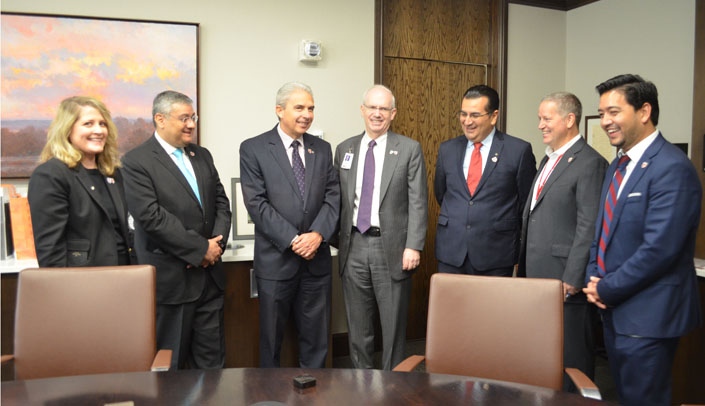A delegation from the University Anahuac Xalapa (UAX) College of Medicine, Xalapa, Veracruz, Mexico, recently visited UNMC to renew, and perhaps expand, a memorandum of understanding (MOU) that was signed last year for academic and research collaborations.
The UAX delegation included: Luis Linares, Ph.D., chancellor; Bernardo Vera, M.D., dean of the College of Medicine; and Omar Torres, dean of the College of International Business & External Affairs. They met with Ali S. Khan, M.D., M.P.H., dean of the College of Public Health; Jane Meza, Ph.D., senior associate dean and chair of biostatistics; Christine Arcari, Ph.D., associate dean for Academic and Student Affairs; Paul Estabrooks, Ph.D., the Harold M. Maurer Distinguished Chair, and chair of health promotion; Armando De Alba, M.D., assistant professor, health promotion; and other university leaders.
The group toured the UNMC campus, taking in iEXCEL, the Fred & Pamela Buffett Cancer Center and the Nebraska Biocontainment Unit. They also toured the University of Nebraska at Omaha campus after meeting with UNO leadership. The delegation’s visit ended Oct. 14 after a binational health fair, a collaboration between UNMC and the Mexican Consulate.
This past year under the MOU, Dr. De Alba directed and delivered the class “Foundations of Public Health” to second-year medical students at UAX and also presented “Foundations of Public Health” to UNMC students on-line. Through technology, more than 40 UNMC and UAX students exchanged academic and professional experiences. Eight UNMC faculty members were guest speakers for the class.
In addition, Mariela Bahena, a UNMC master’s of public health student, conducted a research project over the summer in Xalapa. The study, funded by the Cancer Epidemiology Education in Special Populations program, examined knowledge, beliefs and perceptions about HPV vaccinations among mothers living in Mexico, while a parallel study also was conducted in Nebraska with Mexican mothers living in the Midwest. In Nebraska, the Hispanic population comprises more than 10 percent of the population and is expected to triple by 2050.
“This collaboration provides great opportunities for students to learn about the professional experiences of other colleagues abroad and also it enriches the cultural competence of our future health care professionals,” Dr. De Alba said.
